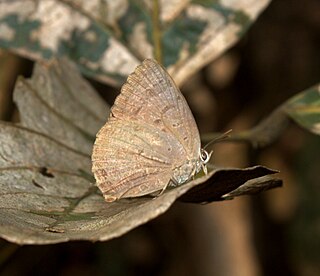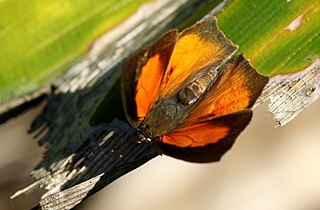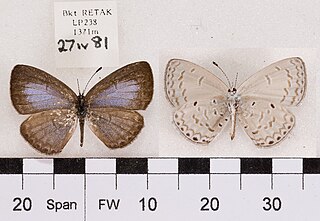Related Research Articles

Gomalia is a monotypic genus of hesperiid butterfly.Gomalia elma, the marbled skipper or African marbled skipper, is found in Africa and parts of Asia.

Arhopala abseus, the aberrant oakblue or aberrant bushblue, is a species of lycaenid or blue butterfly found in Asia.

Arhopala atrax, the dark broken-band oakblue or Indian oakblue, is a species of lycaenid or blue butterfly found in the Indomalayan realm.

Tajuria jehana, the plains blue royal, is a species of lycaenid or blue butterfly found in Asia.

Horaga viola, the brown onyx, a small lycaenid or hairstreak butterfly found in Asia. It is sometimes treated as a subspecies of Horaga albimacula,

Chliaria othona, the orchid tit, is a species of lycaenid or blue butterfly found in Asia.

Deudorix epijarbas, the cornelian or hairy line blue, is a species of lycaenid or blue butterfly found in south and southeast Asia from India to Fiji, including the Philippines, and also the tropical coast of Queensland in Australia. The species was first described by Frederic Moore in 1857.

Curetis acuta, the angled sunbeam, is a species of butterfly belong to the lycaenid family. It is found in Indomalayan realm.
Streptoperas is a genus of moths belonging to the subfamily Drepaninae.

Phazaca is a genus of moths in the family Uraniidae first described by Walker in 1863.

Monodontides musina, the Swinhoe's hedge blue, is a butterfly of the family Lycaenidae. It is found in South-East Asia, including India.
Drapetodes magnifica is a moth in the family Drepanidae. It was described by Charles Swinhoe in 1902. It is found on Peninsular Malaysia, Sumatra, Java and Borneo.
Leucoblepsis neoma is a moth in the family Drepanidae. It was described by Swinhoe in 1905. It is found in Singapore and on Peninsular Malaysia, Sumatra and Borneo.
Tridrepana argentistriga is a moth in the family Drepanidae. It was described by Warren in 1896. It is found in Malaysia, Singapore, Indonesia, Myanmar and Hainan, China.
Tridrepana rubromarginata is a moth in the family Drepanidae. It was described by John Henry Leech in 1898. It is found in China, India, Bhutan and Nepal.
Gogana fragilis is a moth in the family Drepanidae first described by Swinhoe in 1902. It is found on Borneo.
Gogana kerara is a moth in the family Drepanidae first described by Swinhoe in 1902. It is found on Borneo and Peninsular Malaysia.
Gogana tenera is a moth in the family Drepanidae first described by Swinhoe in 1902. It is found on Borneo and Peninsular Malaysia.
Oreta singapura is a moth in the family Drepanidae. It was described by Charles Swinhoe in 1892. It is found in Singapore, Malaysia, Indonesia and New Guinea.
Streptoperas luteata is a moth in the family Drepanidae. It was described by George Hampson in 1895. It is found in the north-eastern Himalayas and on Borneo, Sumatra, Java, Bali and Sulawesi.
References
- ↑ Beccaloni, G.; Scoble, M.; Kitching, I.; Simonsen, T.; Robinson, G.; Pitkin, B.; Hine, A.; Lyal, C., eds. (2003). "Streptoperas crenelata". The Global Lepidoptera Names Index . Natural History Museum . Retrieved May 28, 2018.
- ↑ Savela, Markku. "Streptoperas crenelata Swinhoe, 1902". Lepidoptera and Some Other Life Forms. Retrieved August 13, 2018.
- ↑ Transactions of the Entomological Society of London 1902 (3): 590
| This article on a moth of the subfamily Drepaninae is a stub. You can help Wikipedia by expanding it. |